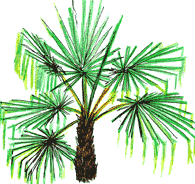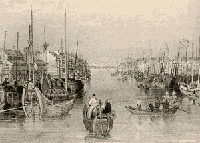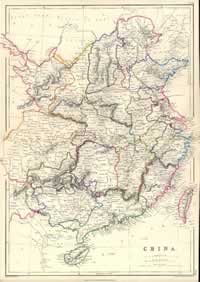Robert Fortune (1812-1880)

Born in Berwickshire, Scotland, on the 16th of September, 1812, Robert Fortune was typical of many plant hunters in his day; a mystery wrapped in an enigma wrapped in a surly personality. Little is known of Fortune's early years, and in his life he made no effort to share this information.
It is known that after his regular schooling he apprenticed in a nearby garden under a one Mr. Buchan. He proved to be an excellent student and eventually secured a position at the Botanic Garden in Edinburgh in 1840 where he trained under the formidable William McNabb. Known as a hard taskmaster McNabb was nonetheless impressed with Fortune and in 1842, when Fortune applied for the position of superintendent of the Hothouse Department at the Horticultural Society's garden at Chiswick, London, it was McNabb's support that secured the position for him.
A few months later Fortune applied for, and was granted, the position of the Society's Collector in China. He was sent on his journey with little pay and an interesting list of requests. He was to find any blue flowered peonies, to find tea plants, and to investigate the peaches growing in the Emperor's private garden, among other things.
On July 6th, 1843 Fortune arrived in Hong Kong after four months at sea and immediately set about looking for plants to fill his Wardian cases with. Over a period of three years, Fortune made many excursions to the northern provinces in China and encountered many harrowing adventures along the way. From angry mobs caught up in a xenophobic frenzy, to killer storms in the Yellow Sea, to pirates on the Yangtse River, he managed to survive them all. Over a period of three years, Fortune made many excursions to the northern provinces in China and encountered many harrowing adventures along the way. From angry mobs caught up in a xenophobic frenzy, to killer storms in the Yellow Sea, to pirates on the Yangtse River, he managed to survive them all.
He eventfully became proficient enough with speaking Mandarin that he was able to adopt the local dress and move among the populous largely unnoticed. By shaving his head and adopting a ponytail, this rather gruff Scotsman was able to effectively blend in. So well in fact, that he able to enter the forbidden city of Souchow (now Wuhsien) unchallenged.
Fortune made several shipments back to England during the three years of his first mission, proving the great value of Dr Ward's invention.
Upon his return to London in May 1846, Robert Fortune published his journals in the book 'Three Years' Wanderings in the Northern Provinces of China'.
 His second journey to China was for the East India company to obtain the finest tea plants to establish plantations in India. Once again he disguised himself as Chinese 'from a distant province', hired an interpreter, and headed into the tea growing regions of the country. His efforts resulted in the shipment of well over 20,000 plants and seedlings, in Wardian cases, to the Himalayas. Thus was established the tea industry in India. His second journey to China was for the East India company to obtain the finest tea plants to establish plantations in India. Once again he disguised himself as Chinese 'from a distant province', hired an interpreter, and headed into the tea growing regions of the country. His efforts resulted in the shipment of well over 20,000 plants and seedlings, in Wardian cases, to the Himalayas. Thus was established the tea industry in India.
Fortune made two more trips to China (1853-56, 1858-59) and one trip to Japan (1860-62), and was responsible for the introduction of over 120 species of plants to western gardens. His publications include:
- 'Three Years' Wanderings in the Northern Provinces of China' (1847)
- 'A Journey to the Tea Countries of China' (1852)
- 'A Residence Among the Chinese' (1857)
- 'Yedo and Peking' (1863)
He lived comfortably on the proceeds of his book sales and enjoyed a long retirement. He died in 1880.
|